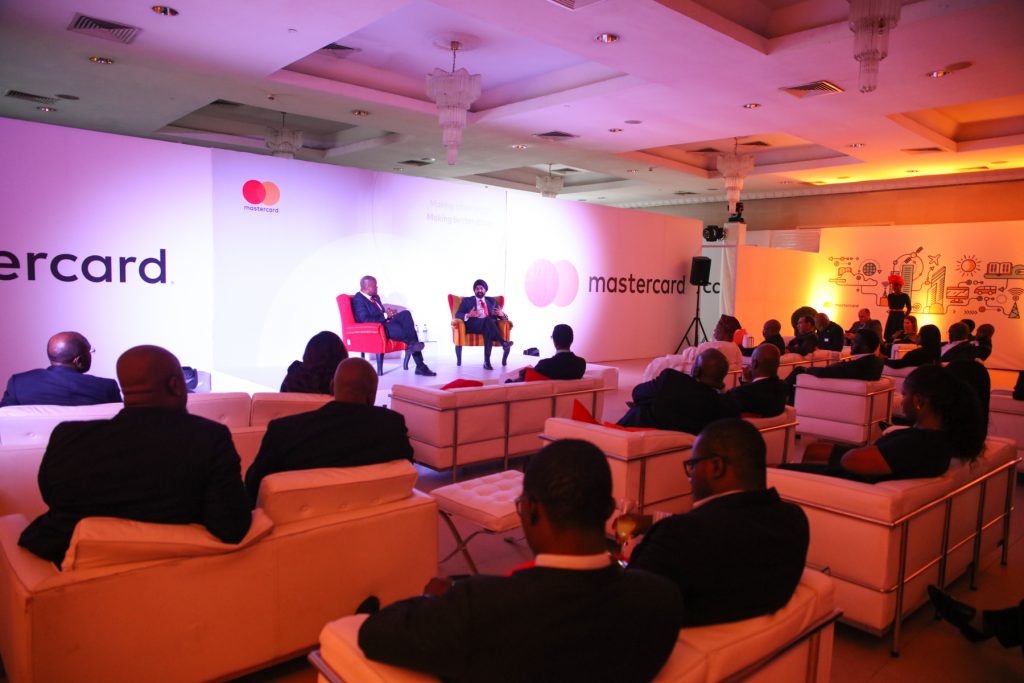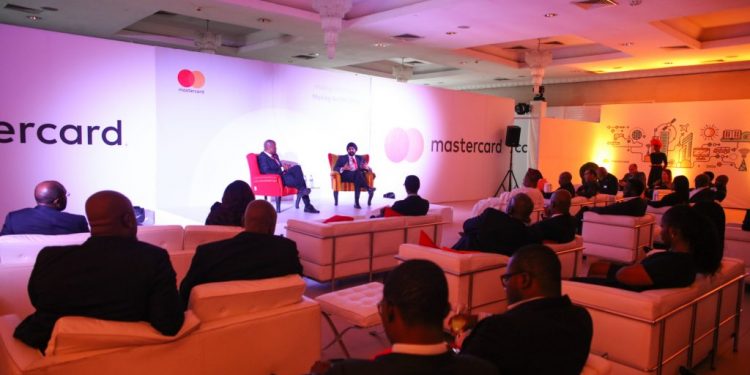With half of Nigeria’s population currently living in cities, it is critical that a development framework is in place to ensure that future growth is sustainable. This was a key message highlighted at the Mastercard CEO Conversations dinner held last night, where dialogue focused on: ‘Developing Nigeria’s Smart Cities through Technology Transformation’.
Bismarck Rewane, renowned economist led discussions with Mastercard president and CEO, Ajay Banga, who is visiting the country this week. Rewane reinforced the point that 60 percent of the country’s Gross Domestic Product (GDP) is generated by those living in cities.
Leaders in businesses attended and joined the discussion with Mastercard President and CEO, Ajay Banga, who is visiting the country this week. Bismarck Rewane, renowned economist, hosted the session and reinforced the point that 60 percent of the country’s Gross Domestic Product (GDP) is generated by those living in cities.
Financial Institution and Telco CEOs and other business leaders gathered for an evening to discuss the country’s continued growth, and the increasingly important role of the private sector. The question of the evening was, how do smart cities deliver economic growth and resilience?
Smart cities leverage technology with open standards and platforms to drive scale in order to deliver economic growth and efficiency. In Nigeria, technology is helping citizens connect to services that help them lead better and easier lives. Mobile is playing an important role, and more Nigerian’s have access to the internet via their smartphones, with current estimates stating that over 97 million users have access.
As cities such as Lagos develop, this technology and other innovations will help serve the growing demands from consumers and businesses. By 2035 close to 30 million people are likely to live in Lagos, making it the largest megacity on the continent.


Discussion focused on the importance of partnerships as part of the cities strategy. It was highlighted that the need for cross functional support is required with further focus on gathering knowledge from global organisations to share best practices and knowledge. The importance of transparency and ease of doing business was also tabled, and with Nigeria recently securing a stronger rating, the country is on the right track to reinforcing its position as an economic powerhouse.
With Africa witnessing the fastest urbanization in the world, the opportunity for economic growth is clear. Urbanisation has a strong correlation with the rate of real GDP growth, because productivity in cities is more than double that in rural communities. As citizens become more productive and have more disposable income, consumer spend can be expected to increase. Consumer and business spending presents a $4 trillion opportunity for businesses to tap in too.
Mastercard has developed many solutions to support this growth, some giving micro and small businesses the opportunity to gain access to a payment solution that will not only making accepting payments easier but also streamline the buying experience for their customers. One of those product-Masterpass QR, launched in 2016, is helping to digitize an important sector in Nigeria and across Africa, and ensures that commerce is more secure and convenient.
Access to solutions that are relevant and fit a need is just one part of the development framework, first a deep understanding of the challenges and opportunities is required. This is where big data comes in says Mastercard. Good use of this data could have a transformative impact on 21st century cities akin to the impact of electrification on 20th century cities. Managing a global payment network allows Mastercard to identify and predict patterns of commercial activity that can help inform more sustainable urban planning.
Cities today must have plans for their future, and become cities for everyone better able to provide citizens with prosperity and a future. This message resonated with the business leaders attending the Mastercard CEO Conversations dinner, which focused on showcasing the dynamic resources available in the country.
Mastercard and Nigerian Business Leaders Commit to Transforming Nigeria’s Cities into Strong Economic Hubs
0
Leave a Reply Cancel reply
BROWSE BY CATEGORIES
- #SmartLagos
- Basketball
- Beauty
- Boxing
- Breaking
- Business
- Careers
- Crime
- Default
- Education
- Entertainment
- Event
- Fashion
- Featured
- Football
- Gaming
- Gist
- Golf
- Health
- Inspirational Patience
- Interview
- Investigative
- Law
- Lifestyle
- local
- MetroMan
- MetroPerson
- metroplus
- MetroProfile
- Movies
- Music
- MUSIC
- New Music
- News
- nolly wood
- Nollywood
- Novels
- Odawood
- Opinion
- Parenting
- Photos
- Politics
- Press Release
- Relationship
- Religion
- Scandal
- Security
- Sex
- Society
- Sports
- Technology
- Travel
- TV
- Videos
- Weird
- Wheels
- World
BROWSE BY TOPICS
#COVID19Nigeria
#EndSARS
Adams Oshiomhole
Akinwunmi Ambode
APC
ASUU
atiku
Atiku Abubakar
Big brother Naija 2020
boko haram
Buhari
Bukola Saraki
CBN
court
COVID-19
davido
ECOWAS
Edo Election
Edo State Election
efcc
Featured
FG
Goodluck Jonathan
gunmen
INEC
Kayode Fayemi
Lagos
Lagos State
Muhammadu Buhari
NCDC
NDLEA
news
Niger
Nigeria
NLC
Obaseki
PDP
police
politics
President Buhari
Sanwo Olu
senate
tinubu
wike
Yemi Osinbajo
© Copyright MetroNews NG 2020. All rights reserved.









